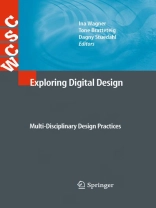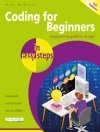Exploring Digital Design takes a multi-disciplinary look at digital design research where digital design is embedded in a larger socio-cultural context. Working from socio-technical research areas such as Participatory Design (PD), Computer Supported Cooperative Work (CSCW) and Human-Computer Interaction (HCI), the book explores how humanities offer new insights into digital design, and discusses a variety of digital design research practices, methods, and theoretical approaches spanning established disciplinary borders. The aim of the book is to explore the diversity of contemporary digital design practices in which commonly shared aspects are interpreted and integrated into different disciplinary and interdisciplinary conversations. It is the conversations and explorations with humanities that further distinguish this book within digital design research. Illustrated with real examples from digital design research practices from a variety of research projects and from a broad range of contexts Exploring Digital Design offers a basis for understanding the disciplinary roots as well as the interdisciplinary dialogues in digital design research, providing theoretical, empirical, and methodological sources for understanding digital design research. The first half of the book Exploring Digital Design is authored as a multi-disciplinary approach to digital design research, and represents novel perspectives and analyses in this research. The contributors are Gunnar Liestøl, Andrew Morrison and Christina Mörtberg in addition to the editors. Although primarily written for researchers and graduate students, digital design practioners will also find the book useful. Overall, Exploring Digital Design provides an excellent introduction to, and resource for, research into digital design.
Inhaltsverzeichnis
A Common Ground.- Researching Digital Design.- Research Practices in Digital Design.- Analytical Perspectives.- Methods That Matter in Digital Design Research.- Multiple Perspectives on Design Research.- A Matter of Digital Materiality.- On Mobility, Localization and the Possibility of Digital Genre Design.- Unreal Estate: Digital Design and Mediation in Marketing Urban Residency.- Whisperings in the Undergrowth: Communication Design, Online Social Networking and Discursive Performativity.- Designing for Sustainable Ways of Living with Technologies.
Über den Autor
Tone Bratteteig, Ph D, is associate professor at the Department of Informatics, University of Oslo, where she leads a research group on Design of Information Systems. She was one of the initiators and the coordinator of the multidisciplinary research initiative, Digital Design, at the University of Oslo. Bratteteig is educated as a computer scientist, but her research background and profile is multidisciplinary and she is involved in several multidisciplinary research projects. Bratteteig has been doing participatory design research from the early 1980s, in later years addressing more general questions concerning design and use of information systems. Her current research focuses on the relations between autonomy and automation when introducing digital technologies that distribute (work) tasks between people and technologies (“Automation and Autonomy”, 2009-2013, funded by The Norwegian Research Council). Pirjo Elovaara, Ph D, is senior lecturer in Technoscience Studies at the School of Planning and Mediedesign, Blekinge Institute of Technology, Sweden. Her research field is based on feminist technoscience and focuses on design and use of information and communication technology. She is especially interested in the concepts and practices of participation and agency. She has also been involved in a number of local and regional ICT development projects in the region of Blekinge, in the southeast of Sweden. Her latest research project, together with Christina Mörtberg, was about gender, skills, technology and e-government with the title ‘From government to e-government: gender, skills, learning and technology’ (2005–2007). Gunnar Liestøl, Ph D, is professor at the Department of Media and Communication, University of Oslo. He has a magister artium degree in literature and a Ph D in media studies on the thesis ‚Essays in Rhetorics of Hypermedia Design‘ (1999). He has designed several hypermedia systems, among them the award-winning ‚Kon-Tiki Interactive‘ (1995). He is the author of numerous articles and books, both national and international, including Digital Media Revisited, (2003, MIT Press, with A. Morrison and T. Rasmussen). Liestøl is currently head of the project: ‚INVENTIO – Theory and Practice on Designing Digital Genres for Learning and Leisure‘ (2006–2010), funded by the Norwegian Research Council, exploring the convergence of mobility and localization in digital media textuality. Andrew Morrison, Ph D, is an associate professor at Inter Media, an interdisciplinary research centre at the University of Oslo and Professor of Interdisciplinary Design at the Institute of Design, Oslo School of Architecture and Design (AHO). His current research is into mixed reality arts, mediatized persuasion in branding and advertising, the collaborative design of a mobile GPS narrative and design and research into digital research rhetoric online. He publishes research and supervises graduate students in these areas at AHO. Andrew co-edited Digital Media Revisited(2003, The MIT Press, with G. Liestøl and T. Rasmussen); he has recently edited and co-authored Inside Multimodal Composition (2009, Hampton Press), a collection of multidisciplinary design and practice-based research pieces with Communication Design at its core. Morrison heads the Communication Design Research Group at Inter Media and is Leader of Design Research at the Institute of Design (AHO). His earlier research and participatory design has been into academic communication and electronic literacies, critical discourse and HIV/AIDS education and prevention. Christina Mörtberg, Ph D, docent/reader, is an associate professor at the Department of Informatics, University of Oslo, Norway and University of Umeå, Sweden. Mörtberg’s current research interests can be described in two interrelated areas that link to each other. In the first, systems design, she bases her research on situated perspectives and participatory design approaches and in the second, a theoretical/methodological perspective is in focus where systems design is studied in combination with theory/methodology based on feminist technoscience and science and technology studies. Mörtberg has been involved in numerous national, Nordic, and international research projects throughout the years and has also been one of the founders of several transnational research networks. She has published and continues to publish her research on her own as well as in collaboration with doctoral students and colleagues. Synne Skjulstad, Ph D, is engaged in postdoctoral research as a scholar at the Department of Media and Communication, University of Oslo. She is working on a research project on cross-mediated and aestheticized advertising and branding in digital domains, labelled BRANDO. Skjulstad has a background in media studies. She has previously worked with practice-based research relating to digital media expressions, from hypervideo, experimental online research mediation, to digital media in dance performance. Her Ph D was an article-based publication that focused on a communication design perspective for textual analysis of multimodal websites. Dagny Stuedahl, Ph D and postdoc at Department of Media and Communication, University of Oslo, has a background in ethnology, history and theatre studies. Her design research focus is related to socio-cultural aspects of participatory design, digital design, communication design – and especially related to design with and for youths. Her background in ethnology brings a concentration on performative interactions between individuals and the collective in media spaces, in which technological artefacts play an important role. Her current research focuses on the interchange between narratives, proximity-based social and personal media and digital environments related to youths’ engagement with digital cultural heritage. Stuedahl was coordinator of CMC convergence track, which has initiated and supported this book project financially. Ina Wagner, Ph D, is professor for Multidisciplinary Systems Design and Computer Supported Co-operative Work (CSCW) and Head of the Institute for Technology Assessment and Design, Vienna University of Technology. After completing her Ph D in physics she spent the first part of her career in science education, researching into and exploring innovative approaches to learning, before moving to the sociology of work, building cooperative relations with designers. Since then she has edited and written numerous books and authored over 150 papers on a variety of issues, amongst them computer-support of hospital work and of architectural design and planning, with a strong focus on CSCW issues, a feminist perspective in science and technology, as well as ethical and political issues in systems design. In her approach to the design of IT systems she combines ethnographic studies of work with design interventions and user participation. This also engages sociological interest in work and occupations, organization, management and technology. From 1995–97 she was Chair of the Equal Opportunity Commission of the Austrian Ministry of Science, Research, and Culture, and from 1997–2000 she was member of the European Group on Ethics in Science and New Technologies. She is member of the Austrian Bioethics Committee, since 2001. From 2005–2007 she held a CMC– Professor II position at Oslo University; since 2009 she is adjunct professor in Design of Information Systems, Department of Informatics at the University of Oslo. Even Westvang, tinkers, designs and develops for digital media, something he has been doing professionally since 1995. Currently he splits his time between the two web services Underskog and Origo. He has worked closely on these and many other projects with Simen Skogsrud, also a co-founder of the innovative Oslobased digital media and design company Bengler. Simen Svale Skogsrud, sees himself as a storyteller by way of technology and has worked with an array of media over the last 15 years. He currently tends to the social websites origo.no and underskog.no. His first novel, Pragma, was published in 2004 (Tiden). More about Simen is available at http://origo.no/simen.












